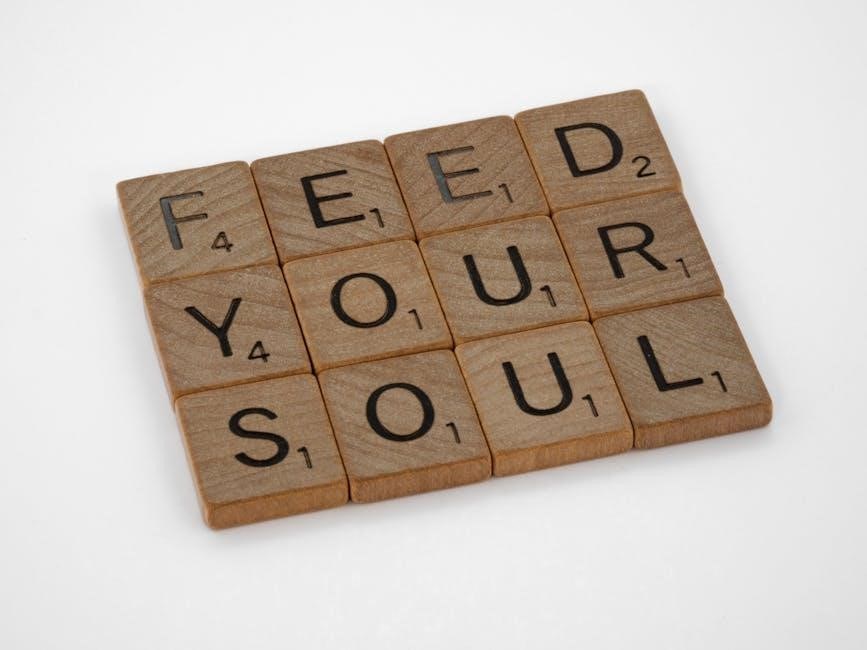Mastering your mind and emotions is the key to unlocking personal growth, resilience, and fulfillment․ Learn how to gain control over your thoughts and feelings to achieve emotional balance and mental clarity․ Discover practical techniques to rewire your brain, overcome negative patterns, and cultivate a positive mindset for lasting well-being․
Overview of the Importance of Mental and Emotional Control
Mental and emotional control are essential for achieving personal growth, improving decision-making, and fostering healthy relationships․ By mastering your mind, you can overcome negative thoughts, manage stress, and cultivate resilience․ Emotional regulation enhances self-awareness, allowing you to respond to challenges calmly and intentionally․ Poor emotional control can lead to anxiety, strained relationships, and impulsive decisions․ Learning to control your mind and emotions empowers you to navigate life’s complexities with confidence and clarity, leading to a more balanced and fulfilling life․ This skill is vital for long-term well-being and success․
Why Mastering Your Mind and Emotions is Crucial for Personal Growth
Mastering your mind and emotions is essential for personal growth, as it empowers you to overcome negative patterns, build resilience, and make intentional decisions․ Emotional awareness and control enable you to respond to challenges constructively, fostering healthier relationships and a stronger sense of self․ By gaining command over your thoughts and feelings, you cultivate mental clarity, reduce stress, and unlock your full potential for growth and fulfillment․ This mastery serves as the foundation for achieving long-term well-being and realizing your goals․
Understanding the Connection Between Thoughts and Feelings
Thoughts and feelings are deeply intertwined, influencing each other in a continuous cycle․ Negative thoughts can trigger harmful emotions, while positive ones foster well-being․ Recognizing this connection is vital for emotional mastery, as it allows you to identify patterns and intervene when necessary․ By understanding how your mind shapes your emotions, you can learn to regulate both, breaking cycles of negativity and cultivating a balanced, resilient mindset․ This awareness is the first step toward mastering your mental and emotional states effectively․

The Science Behind Mind Control and Emotional Regulation
The brain processes thoughts and emotions through neural pathways, influenced by neuroplasticity․ Understanding this science helps rewire your mind, enabling better control over emotional responses and decision-making․
The Neuroscience of Emotions and Decision-Making
Emotions significantly influence decision-making by activating brain regions like the amygdala and prefrontal cortex․ The amygdala processes emotional stimuli, while the prefrontal cortex regulates rational choices․ Neuroscience reveals that emotional states can override logical reasoning, often leading to impulsive decisions․ Understanding this interplay helps in developing strategies to balance emotional responses with cognitive control․ By leveraging neuroplasticity, individuals can rewire their brains to enhance emotional regulation and improve decision-making processes․ This scientific foundation is key to mastering emotional and mental well-being effectively․
How the Brain Processes Thoughts and Emotions
The brain processes thoughts and emotions through interconnected neural networks․ The amygdala detects emotional stimuli, triggering immediate responses, while the prefrontal cortex regulates rational decision-making․ Emotions often bypass logical reasoning, leading to impulsive actions․ Neuroplasticity allows the brain to rewire itself, enabling better emotional control․ By understanding this process, individuals can develop strategies to manage thoughts and feelings, fostering mental clarity and emotional balance․ This knowledge is essential for mastering the mind and achieving lasting well-being․
The Role of Neuroplasticity in Rewiring Your Mind
Neuroplasticity, the brain’s ability to reorganize itself, plays a crucial role in rewiring your mind․ By practicing mindfulness, meditation, and cognitive restructuring, you can create new neural pathways that replace negative thought patterns with positive ones․ This process enhances mental flexibility, allowing you to better manage emotions and respond to challenges constructively․ Neuroplasticity empowers you to break free from limiting beliefs and develop a resilient, adaptive mindset, paving the way for lasting emotional mastery and personal growth․
Practical Techniques for Controlling Your Mind
Master your mind with techniques like mindfulness meditation, cognitive restructuring, and visualization․ These tools help rewire your thoughts, fostering mental clarity and emotional balance for lasting well-being․
Mindfulness Meditation for Mental Clarity
Mindfulness meditation is a powerful practice that helps you observe your thoughts without judgment, fostering mental clarity․ By focusing on the present moment, you can reduce mental clutter and emotional reactivity․ Regular practice strengthens self-awareness, allowing you to respond to situations more thoughtfully rather than react impulsively․ This technique cultivates emotional balance, resilience, and a calm, focused mind․ Incorporating mindfulness into your routine can lead to profound changes in how you manage stress and maintain mental well-being․
Cognitive Restructuring to Challenge Negative Thoughts
Cognitive restructuring is a potent tool for transforming negative thought patterns into positive, constructive ones․ By identifying and challenging unhelpful beliefs, you can replace them with realistic, empowering perspectives․ This process involves questioning the validity of negative thoughts, examining evidence for and against them, and reframing them in a balanced way․ Regular practice enhances emotional resilience, reduces stress, and fosters a more optimistic mindset, helping you gain control over your emotions and respond to challenges more effectively․
The Power of Visualization in Shaping Your Mindset
Visualization is a transformative technique that harnesses the mind’s ability to create vivid mental images, reshaping your mindset and emotions․ By envisioning positive outcomes and desired states, you can rewire your brain to embrace confidence, calmness, and resilience․ This practice not only enhances focus but also strengthens your belief in achieving goals․ Regular visualization fosters a proactive approach to challenges, helping you cultivate a mindset that thrives on positivity and self-control, ultimately mastering your feelings and thoughts with greater ease and precision․
Strategies for Mastering Your Emotions
Mastering emotions involves recognizing triggers, practicing gratitude, and using techniques to manage feelings․ Gain emotional balance by understanding and controlling your responses to challenging situations effectively․
Recognizing and Labeling Your Emotions
Recognizing and labeling emotions is the first step toward mastering them․ By acknowledging how you feel without judgment, you gain clarity and control․ This practice helps identify emotional triggers and patterns, allowing you to address them constructively․ Labeling emotions reduces their intensity and empowers you to respond thoughtfully rather than react impulsively․ This foundational skill is essential for emotional mastery and mental well-being, enabling you to navigate life’s challenges with greater ease and resilience․
Techniques to Manage Emotional Triggers
Emotional triggers can instantly activate strong reactions, but with the right techniques, you can manage them effectively․ Start by identifying your triggers and understanding their root causes․ Practice mindfulness to stay present and observe emotions without reacting․ Use breathing exercises to calm your nervous system and create a pause between trigger and response․ Cognitive restructuring helps challenge and reframe unhelpful thoughts․ Visualization and grounding techniques can also help you stay focused and composed․ These strategies empower you to respond thoughtfully, reducing emotional overwhelm and fostering emotional balance․
Practicing Gratitude to Shift Emotional States
Gratitude is a powerful tool for transforming emotional states․ By focusing on what you appreciate, you can shift from negativity to positivity․ Start a daily gratitude journal to write down three things you’re thankful for․ Share gratitude with others through kind words or actions․ Mindful reflection on blessings can rewire your brain to notice the good in life․ This practice fosters emotional balance, resilience, and a deeper sense of well-being, helping you master your feelings and cultivate a joyful mindset․

The Role of Self-Awareness in Emotional Mastery
Self-awareness is the cornerstone of emotional mastery․ Recognizing your thoughts, feelings, and triggers empowers you to manage emotions effectively․ By understanding your mindset, you can align your actions with your goals, fostering emotional balance and mental clarity․
Understanding Your Emotional Triggers
Emotional triggers are stimuli that activate intense feelings, often rooted in past experiences or deep-seated beliefs․ Recognizing these triggers is essential for mastering emotions, as they dictate reactions and behaviors․ By identifying patterns in your responses, you can address underlying causes and develop strategies to manage them effectively․ Self-awareness tools, such as journaling, help uncover triggers, enabling you to respond thoughtfully rather than react impulsively․ This awareness is the first step toward gaining control over your emotional responses and fostering mental resilience․
Developing Self-Awareness Through Journaling
Journaling is a powerful tool for cultivating self-awareness, enabling you to reflect on your emotions, thoughts, and experiences․ By documenting your feelings and reactions, you can identify patterns and gain insights into your behaviors․ Regular journaling helps you recognize emotional triggers and understand your responses, fostering better emotional regulation․ Over time, this practice promotes honesty with yourself, encourages personal growth, and strengthens your ability to manage emotions mindfully․
Using Self-Reflection to Gain Insights
Self-reflection is a transformative practice that allows you to examine your thoughts, emotions, and actions deeply․ By regularly reflecting on your experiences, you uncover patterns, motivations, and areas for growth․ This process enhances your ability to recognize emotional triggers and understand your reactions, fostering greater self-awareness․ Through introspection, you gain clarity on your values and goals, empowering you to make intentional decisions․ Regular self-reflection cultivates emotional intelligence, helping you navigate challenges with resilience and mindfulness․

Overcoming Negative Thought Patterns
Identify and challenge negative thoughts, replacing them with positive affirmations․ Practice cognitive restructuring to shift perspectives and build resilience against harmful mental habits and emotional triggers․
Identifying and Challenging Negative Beliefs
Recognize patterns of negative thinking by questioning their validity and impact on your life․ Challenge these beliefs by examining evidence for and against them․ Replace limiting beliefs with empowering, realistic ones․ Journaling or reflection can help uncover deeply ingrained thoughts․ Practice cognitive restructuring to shift perspectives and build mental resilience․ Addressing negative beliefs is a cornerstone of emotional mastery, enabling you to reclaim control over your mindset and responses to life’s challenges․
Replacing Negative Thoughts with Positive Affirmations
Positive affirmations are powerful tools to rewire your mind by substituting negative thoughts with constructive ones․ By repeatedly practicing empowering statements, you can shift your mindset and build confidence․ For example, replacing “I’m not good enough” with “I am capable and deserving of success․” Consistency is key—use affirmations daily to foster resilience and emotional balance․ This practice, backed by neuroplasticity, helps your brain adapt to healthier thought patterns, promoting long-term mental well-being and emotional mastery․
Building Resilience Against Negative Influences
Resilience is the cornerstone of emotional mastery, enabling you to withstand and overcome negative influences․ Start by setting clear boundaries with toxic individuals or environments․ Practice mindfulness to recognize and challenge harmful thoughts․ Cultivate self-awareness to identify triggers and develop coping strategies․ Surround yourself with positive influences and focus on personal growth․ By limiting exposure to negativity and nurturing a strong, positive mindset, you empower yourself to thrive despite external challenges․ This builds long-term emotional strength and mental clarity․

Advanced Methods for Emotional Regulation
Explore breathing techniques, physical exercise, and music to regulate emotions․ These methods help calm the mind, balance feelings, and enhance mental clarity for lasting emotional well-being․
Using Breathing Techniques to Calm Your Mind
Breathing techniques are powerful tools for emotional regulation․ Deep, controlled breathing can calm the nervous system, reduce stress, and promote mental clarity․ Methods like diaphragmatic breathing and the 4-7-8 technique help slow down heart rate and focus the mind․ Regular practice strengthens emotional resilience, making it easier to manage triggers and maintain balance․ These exercises are simple yet effective, providing immediate relief and long-term benefits for mental well-being․ Incorporate them into your daily routine to enhance emotional mastery and inner peace․
Physical Exercise as a Tool for Emotional Balance
Physical exercise is a natural way to achieve emotional balance and mental clarity․ Activities like walking, yoga, and cardio stimulate endorphins, which boost mood and reduce stress․ Regular exercise enhances brain function, improving focus and resilience․ It also provides a healthy outlet for processing emotions, helping to manage triggers and maintain calm․ Consistent physical activity fosters long-term emotional well-being, making it easier to control your mind and master your feelings effectively․ Incorporate exercise into your routine for a balanced and peaceful life․
Leveraging the Power of Music to Influence Emotions
Leveraging the Power of Music to Influence Emotions
Music has a profound impact on emotional states, offering a powerful tool for emotional mastery․ By selecting specific genres or playlists, individuals can elevate mood, reduce stress, or evoke calmness․ Research shows that music activates brain regions linked to emotional processing, helping to shift perspectives and manage feelings effectively․ Whether through uplifting melodies or soothing rhythms, music provides a natural way to influence and balance emotions, enhancing mental well-being and resilience in daily life․

Case Studies and Success Stories
Real-life examples of individuals mastering their emotions and thoughts, achieving mental clarity and resilience․ Inspiring stories from the free PDF guide, showing practical techniques in action․
Real-Life Examples of Mind Control and Emotional Mastery
Discover inspiring stories of individuals who transformed their lives by mastering their emotions and thoughts․ Learn how they applied techniques like mindfulness and visualization to achieve mental clarity and resilience․ The free PDF guide shares real-life success stories, showcasing how practical strategies can help overcome anxiety, improve focus, and cultivate emotional balance․ These examples highlight the power of self-awareness and intentional mindset shifts, offering motivation and insights for your own journey toward emotional mastery and mental control․
Interviews with Experts in Mental and Emotional Wellness
Gain insights from leading experts in mental and emotional wellness as they share proven strategies for mastering your mind and emotions․ The free PDF guide features interviews with psychologists, mindfulness coaches, and motivational speakers, offering practical advice on cognitive restructuring, emotional regulation, and building resilience․ Learn how to apply these techniques in daily life to achieve mental clarity, reduce stress, and foster a positive mindset․ Their expertise provides a roadmap for lasting emotional well-being and personal growth․
Testimonials from Individuals Who Have Mastered Their Minds
Discover inspiring stories from individuals who have transformed their lives by mastering their minds and emotions․ The free PDF guide shares heartfelt testimonials, revealing how others have overcome stress, anxiety, and negative thought patterns․ Hear from people who have achieved emotional balance, improved relationships, and unlocked their full potential․ Their journeys highlight the power of mental and emotional mastery, offering motivation for your own path to personal growth and well-being․

Implementing Your Learning into Daily Life
Transform your habits and thoughts by applying the guide’s strategies daily․ Consistent practice will help you achieve emotional balance, clarity, and lasting personal growth․ Start today!
Creating a Daily Routine for Mental and Emotional Practice
Establishing a consistent routine is essential for mental and emotional well-being․ Begin your day with mindfulness meditation to clear your mind․ Incorporate journaling to track your thoughts and emotions, identifying patterns and areas for growth․ Engage in physical exercise to release endorphins, which enhance mood and energy․ Practice gratitude by listing three positive aspects of your day․ End with reflection, reviewing progress and setting intentions for tomorrow․ Consistency is key to fostering resilience and emotional balance․
Setting Goals for Personal Growth and Development
Setting clear, achievable goals is vital for personal growth and emotional mastery․ Start by identifying specific areas you wish to improve, such as reducing negative thoughts or enhancing self-awareness․ Break these goals into smaller, manageable steps to ensure progress․ Regularly track your advancements and celebrate milestones to stay motivated․ Align your objectives with your core values to maintain focus and purpose․ By setting and working toward these goals, you create a roadmap for lasting transformation and emotional well-being․
Tracking Progress and Celebrating Small Wins
Tracking your progress and celebrating small victories is essential for maintaining motivation and confidence․ Use a journal or planner to document daily achievements, no matter how minor․ Recognizing these milestones helps reinforce positive habits and builds resilience․ Acknowledge each step forward with gratitude, whether through reflection or a simple reward․ This practice fosters a mindset of growth and encourages persistence, ensuring steady advancement toward your goals of emotional mastery and mental clarity․
Mastering your mind and emotions is a transformative journey․ By applying these strategies, you’ll gain resilience, clarity, and emotional balance․ Stay committed, and embrace the power of self-control for lasting well-being․
Recap of Key Concepts for Mind Control and Emotional Mastery
Mastering your mind and emotions involves understanding their interconnectedness and leveraging techniques like mindfulness, visualization, and cognitive restructuring․ Self-awareness is crucial for identifying triggers and rewriting negative thought patterns․ By practicing gratitude, emotional labeling, and breathing exercises, you can regain control over your mental state․ Neuroplasticity allows you to rewire your brain, fostering resilience and positivity; Consistent practice and self-reflection are essential for achieving emotional balance and long-term personal growth․
Encouragement to Continue Practicing and Learning
Embracing the journey of mind control and emotional mastery is a lifelong path that leads to profound personal growth and self-discovery․ Consistently practicing techniques like mindfulness, visualization, and cognitive restructuring will empower you to regain control over your thoughts and emotions․ Stay committed, celebrate small victories, and remind yourself of your goals․ The more you dedicate time to these practices, the more resilient and balanced you’ll become․ Keep exploring resources and guides to deepen your understanding and mastery of your mind and emotions․
Final Tips for Maintaining Mental and Emotional Wellness
Consistently practice mindfulness and self-reflection to stay attuned to your emotions․ Incorporate daily routines that foster mental clarity, such as meditation or journaling․ Set realistic goals and celebrate progress, no matter how small․ Prioritize self-care activities that bring joy and relaxation․ Surround yourself with supportive individuals who encourage growth․ Regularly challenge negative thought patterns and replace them with positive affirmations․ Embrace lifelong learning by exploring new techniques and resources to deepen your emotional mastery․ Remember, mental and emotional wellness is a journey, not a destination․

Additional Resources
- Explore recommended books, online courses, and supportive communities to deepen your understanding of mind control and emotional mastery, enhancing your personal growth journey․
Recommended Books and Articles on the Topic
Discover insightful books and articles that explore the science and practice of mind control and emotional mastery․ Titles like “The Power of Your Subconscious Mind” and “Emotional Intelligence” offer practical strategies for mental clarity and emotional balance․ Online articles from mental wellness experts provide actionable tips on managing thoughts and feelings․ These resources complement the free PDF guide, offering a comprehensive toolkit for personal growth and emotional well-being․ Explore these materials to deepen your understanding and enhance your journey toward mastery․
Online Courses and Workshops for Further Learning
Enhance your journey with online courses and workshops dedicated to mind control and emotional mastery․ Platforms like Coursera and Udemy offer courses on mindfulness, emotional intelligence, and cognitive-behavioral techniques․ Workshops led by mental wellness experts provide interactive exercises and personalized insights․ These resources offer flexible learning opportunities to deepen your understanding of emotional regulation and mental clarity․ Explore these courses to gain practical skills and support your growth toward mastering your mind and emotions effectively․
Communities and Forums for Support and Discussion
Join online communities and forums dedicated to mental and emotional wellness to connect with like-minded individuals․ Platforms like Reddit’s mental health communities or specialized forums offer spaces for open discussions and shared experiences․ Engage with experts and peers, gain insights, and receive support․ These communities provide valuable resources, advice, and encouragement to help you stay motivated on your journey to master your mind and emotions․ Active participation fosters growth and accountability in a supportive environment․
Free PDF Download: “Control Your Mind and Master Your Feelings”
Download the free PDF guide to master your thoughts and emotions․ Discover practical techniques for mental clarity, emotional balance, and personal growth․ Access it easily now!
How to Access the Free PDF Guide
Accessing the free PDF guide is simple and straightforward․ Click on the download link provided, enter your email address to verify your request, and confirm your subscription․ Within minutes, you’ll receive the guide in your inbox․ The PDF is completely free, offering instant access to powerful strategies for controlling your mind and mastering emotions․ No additional sign-ups or payments are required․ Secure your copy today and begin your journey toward mental clarity and emotional well-being․
What to Expect from the Guide
This comprehensive guide offers insights into mastering your mind and emotions, providing practical techniques for mental clarity and emotional balance․ Discover how to rewire your brain, overcome negative thought patterns, and cultivate resilience․ Learn about mindfulness, visualization, and gratitude practices to transform your mindset․ The guide also includes real-life success stories and expert tips to help you achieve lasting emotional well-being․ It’s a valuable resource for anyone seeking to take control of their thoughts and feelings․
Benefits of Using the Guide for Personal Growth
This guide empowers you with tools to enhance self-awareness, helping you understand and manage your emotions effectively․ It provides practical techniques to build resilience, improve decision-making, and foster a positive mindset․ By mastering your thoughts and feelings, you’ll gain confidence, reduce stress, and improve relationships․ The guide’s strategies promote emotional balance, enabling you to navigate life’s challenges with clarity and calm․ It’s a transformative resource for achieving lasting personal growth and emotional well-being․